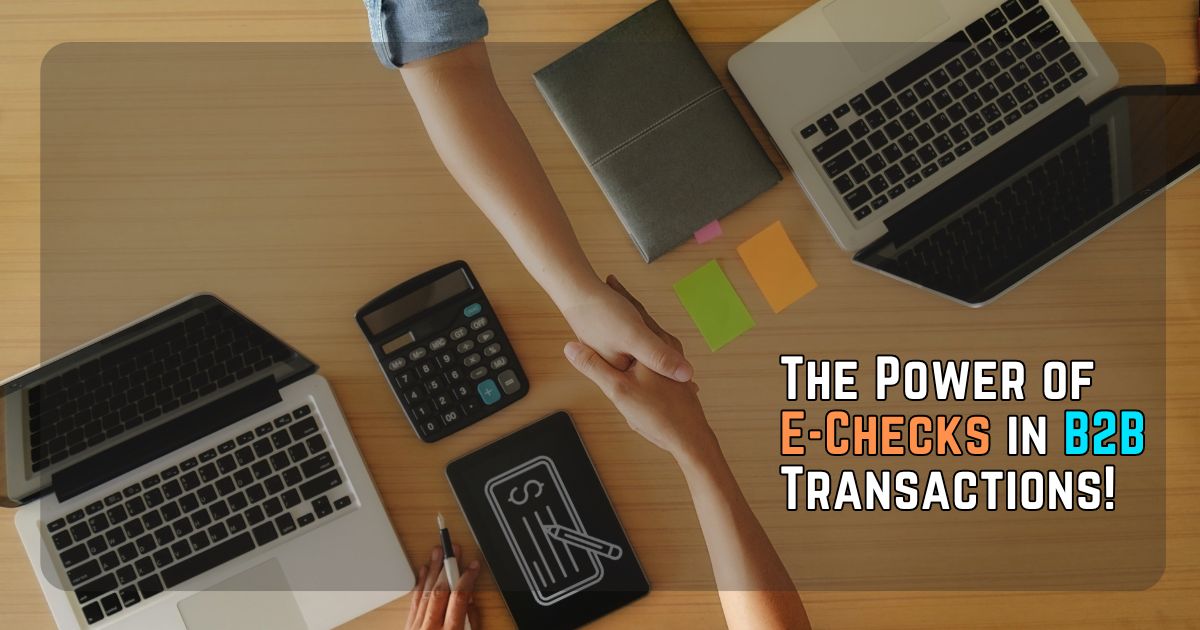
| January 2nd, 2024 |
Unlocking B2B Efficiency — The Power of E-Checks in Modern Transactions!
In the ever-evolving landscape of business-to-business (B2B) transactions, the quest for efficiency and security is unending. Traditional payment methods, once the backbone of commerce, are now facing stiff competition from digital alternatives. One such method that has emerged as a game-changer is Electronic Checks or E-checks. In this blog post, we’ll delve into the profound impact of E-checks on B2B transactions, uncovering the reasons behind their increasing popularity, and examining how they contribute to a more streamlined and secure business ecosystem.
The Evolution of B2B Transactions —
B2B transactions have undergone a remarkable transformation over the years. Gone are the days of manual processes involving paper checks, lengthy approval cycles, and the inherent risk of human errors. Today, businesses operate in a fast-paced digital environment where speed, accuracy, and security are paramount. In this context, E-checks have emerged as a technological innovation that aligns seamlessly with the needs of modern B2B transactions.
Understanding E-Checks —
1. Digital Convenience and Speed:
E-checks represent a digital version of traditional paper checks, offering the same level of security and legality but with enhanced efficiency. The digital format allows for faster processing times, eliminating the delays associated with physical transportation and manual handling. In the fast-paced world of B2B transactions, speed is often a competitive advantage, and E-checks deliver on this front.
2. Reduced Operational Costs:
Traditional check processing involves substantial operational costs related to paper, printing, postage, and manual labor. E-checks drastically cut down these costs by leveraging electronic systems for creation, delivery, and processing. The result is a more cost-effective solution that allows businesses to allocate resources more efficiently.
3. Streamlined Workflows:
E-checks integrate seamlessly into existing digital workflows, providing a smoother experience for businesses engaged in B2B transactions. From invoice generation to payment processing, the entire cycle becomes more streamlined, reducing the need for manual intervention and minimizing the scope for errors.
The Advantages of E-Checks in B2B Transactions —
1. Enhanced Security:
Security is a paramount concern in B2B transactions, where large sums of money are often involved. E-checks offer advanced security features, including encryption and authentication measures, to protect against fraud and unauthorized access. The digital trail left by E-checks provides a transparent and traceable record of transactions, bolstering trust between parties.
2. Real-Time Tracking and Reporting:
E-checks empower businesses with real-time tracking and reporting capabilities. This transparency allows both the payer and payee to monitor the status of transactions, reducing uncertainties and providing a clear understanding of the financial landscape. Such visibility enhances decision-making processes and contributes to better financial management.
3. Global Accessibility:
In the era of globalized business, the geographical barriers to transactions are a significant challenge. E-checks, being digital, overcome these obstacles and enable businesses to engage in B2B transactions seamlessly across borders. This global accessibility opens up new opportunities for expansion and collaboration.
4. Integration with Financial Software:
E-checks integrate effortlessly with various financial software and enterprise resource planning (ERP) systems. This interoperability ensures that businesses can incorporate E-checks into their existing financial ecosystems without disrupting established processes. Such integration further promotes efficiency by reducing manual data entry and facilitating automatic reconciliation.
Future Trends and Innovations —
As businesses continue to embrace E-checks for B2B transactions, the technology is poised for further advancements. Some notable trends and innovations on the horizon include:
1. Blockchain Integration:
The integration of blockchain technology with E-checks holds the potential to revolutionize the security and transparency of B2B transactions. Blockchain ensures an immutable ledger, reducing the risk of fraud and enhancing the authenticity of digital checks.
2. Artificial Intelligence for Fraud Detection:
The application of artificial intelligence (AI) in E-check processing is expected to play a crucial role in identifying and preventing fraudulent activities. Machine learning algorithms can analyze patterns and detect anomalies, providing an additional layer of security to B2B transactions.
3. Smart Contracts:
Smart contracts, self-executing agreements with the terms of the contract directly written into code, can automate and streamline B2B transactions further. The integration of E-checks with smart contracts has the potential to create a more efficient and automated payment ecosystem.
Overcoming Challenges and Embracing Change —
While E-checks offer a plethora of benefits for B2B transactions, businesses must also address certain challenges associated with their adoption. These challenges include:
1. Resistance to Change:
The transition from traditional payment methods to E-checks may face resistance from businesses accustomed to established processes. Educating stakeholders about the benefits and providing seamless onboarding experiences can mitigate this resistance.
2. Cybersecurity Concerns:
The digital nature of E-checks raises cybersecurity concerns. Businesses must invest in robust cybersecurity measures to safeguard sensitive financial information and build trust among stakeholders.
3. Regulatory Compliance:
Adhering to regulatory frameworks governing digital transactions is crucial. Businesses must stay abreast of evolving regulations to ensure compliance and mitigate legal risks associated with E-check usage.
Conclusion — Embracing the E-Check Revolution:
In the dynamic realm of B2B transactions, the efficiency of E-checks is indisputable. As businesses strive to stay ahead in a digital economy, the adoption of E-checks emerges as a strategic move that not only enhances operational efficiency but also contributes to the overall growth and sustainability of enterprises. The journey towards a more efficient and secure B2B transaction ecosystem is paved with technological innovations, and E-checks are undoubtedly at the forefront of this transformative journey. Embracing the E-check revolution is not just a choice; it is a necessity for businesses aspiring to thrive in the fast-evolving landscape of modern commerce.
